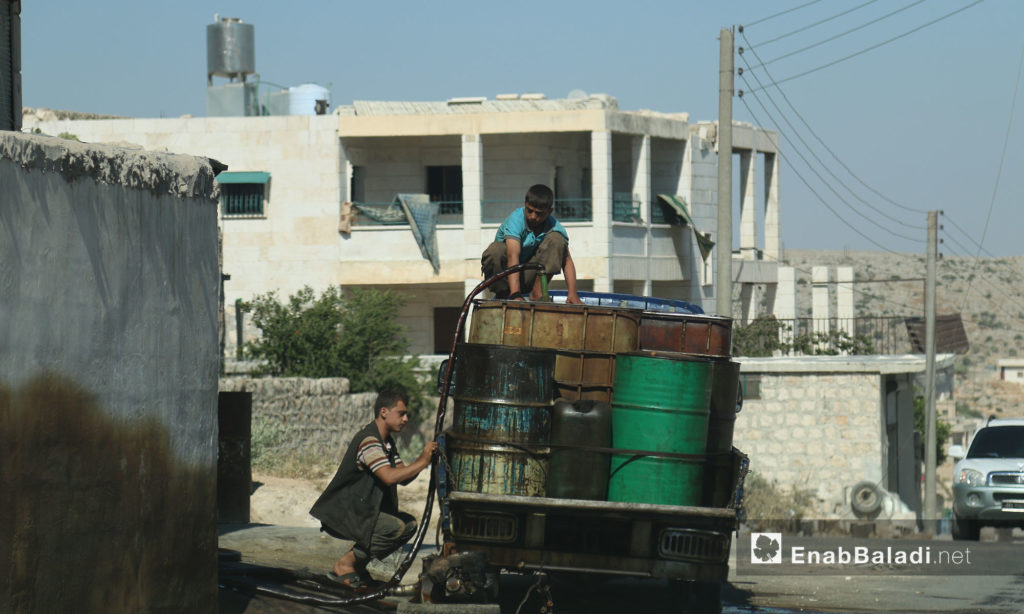The purchase of fuel turned complicated in Daraa, after the government of the Syrian regime put the fuel smart card system into practice, which resulted in a state of confusion among the people, who were lost between two options, either using the fuel’s smart cards or buying it from the black market for the high prices it demands.
Adoption of Smart Cards
Late in December 2018, the Ministry of Petroleum and Mineral Resources of the government of the Syrian regime put the “Smart Card” system in practice in Daraa governorate’s filling stations.
According to the post, which the Ministry published on its “Facebook” page, the Smart Card was activated on December 21, thus, obliging car owners to have the card to refuel their vehicles.
The filling stations started implementing the resolution and refused to provide vehicle owners, who do not have the smart card, with fuel and gasoline.
The Ministry of Petroleum and Mineral Resources set the shares, allocated through the smart card, with about 40 liters per day as follows: 155 liters per month for under 3000 CC privately owned vehicles, 175 liters per month for 3000 CC privately owned vehicles, and 250 liters per month for publicly owned vehicles.
Motorcycles are allowed to fill 2% of the shares allocated for the smart card, amounting to three liters a day.
Last August, the Syrian regime began to apply the smart card system at the filling stations in Damascus and a number of Syrian governorates. The aim is to determine the allocations of gasoline to private and publicly owned vehicles and to control the quantities distributed.
How Do Citizens Obtain Fuel?
The card system is new to the area’s people, so its mechanisms are still somewhat unknown to many citizens; several of whom, according to what has been monitored by Enab Baladi, have inquires about the manners, mechanisms and refilling conditions.
“Abu Hussain”, the director of a filling station in Daraa, told Enab Baladi that citizens can obtain fuel through the municipalities, which provided the families, having a family register, with 100 liters’ vouchers for each family, per month.
However, dozens of families, especially couples that married in the past seven years, could not register marriages or births once their areas went out of the regime’s control. Similarly, the families of dozens of defectors from the Assad’s forces, who signed the settlement deal, failed to obtain family registers, which deprives them of the fuel shares allocated by the government, said Omar, a former defector from the Assad’s forces.
Omar was forced to buy fuel from the black market at a higher price than that demanded by the governmental center because he did not extract the official documents, as did families which cannot make do with the 100 monthly liters.
Fuel Prices in the Southern Region
The prices of fuel in the southern region rose after the provision of fuel was limited to holders of the smart card and recorded a remarkable increase, according to what Enab Baladi has monitored, for the price of a single liter of mazout reached 400 Syrian pounds, while it is sold for 250 Syrian pounds in stations.
The fuel traders’ monopoly and the increasing demand in winter contributed to the rapid rise of prices in the region.
Fuel is fundamental for agriculture and one of the farmers’ basic needs in the governorate, located in southern Syria, as in all agricultural areas.
The fear of Daraa’s farmers is amplifying since winter is about to end and spring is closing in while the fuel prices are on the rise, especially because most of the water extracted from wells needs fuel.
“Abu Samer,” one of Daraa’s farmers, on the condition of anonymity told Enab Baladi that the regime has restricted fuel provision to licensed vehicles, and there was not any generalization from the Directorate about the manner with which farmer’s are to be supplied with fuel.
He added: “Farmers are waiting for the unknow. May God save us from another increase of prices.”
Farmers need massive amounts of fuel to serve agricultural lands, according to the land’s area, need and type of plants cultivated. “Abu Samer,” for example, needs 5000 liters every month.

